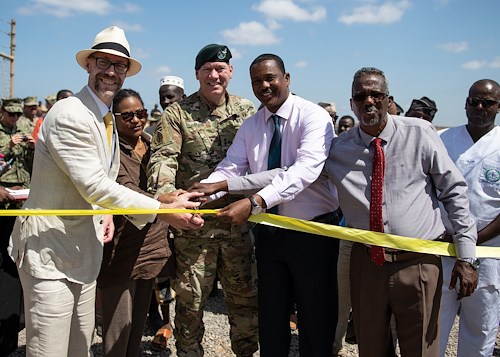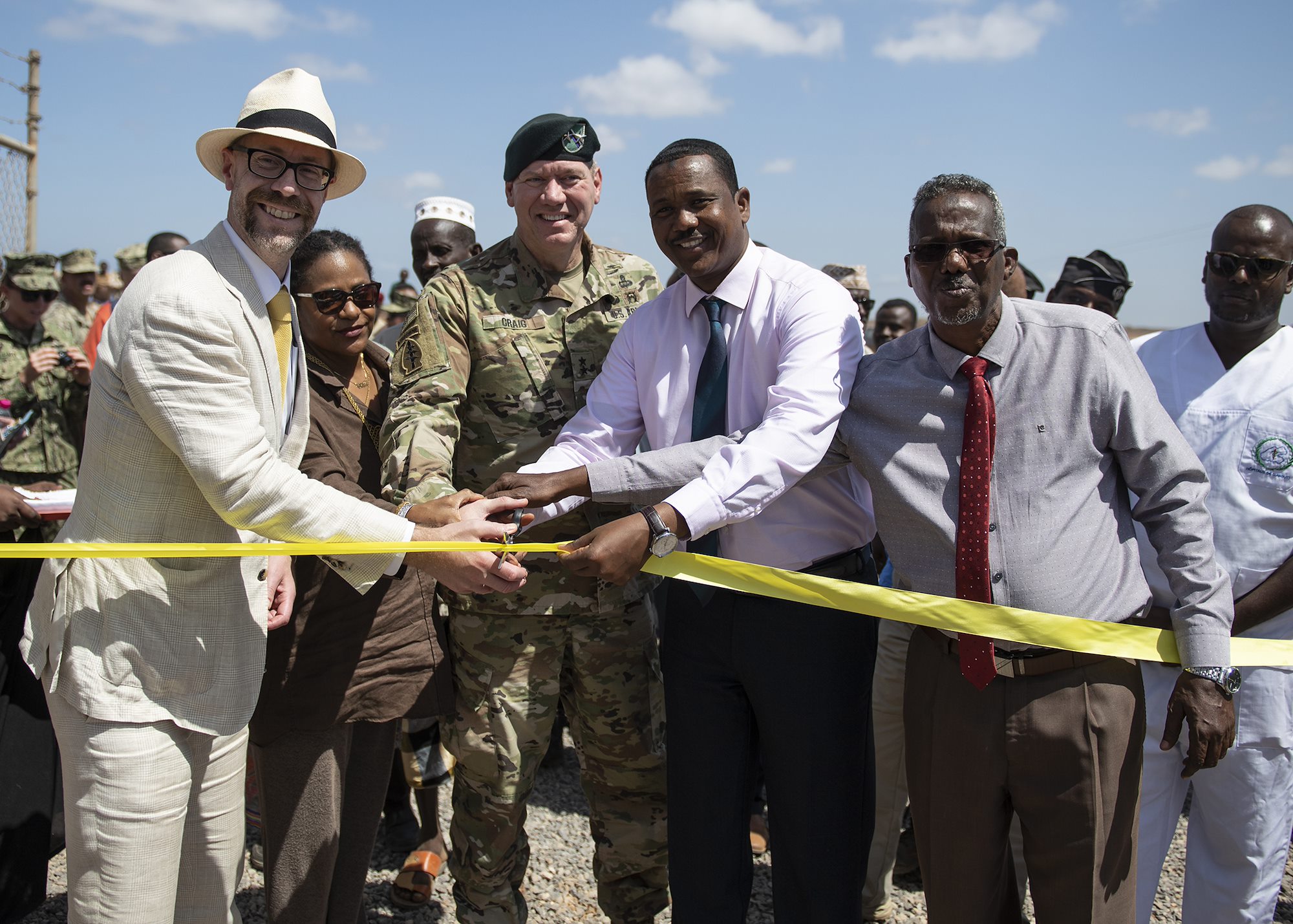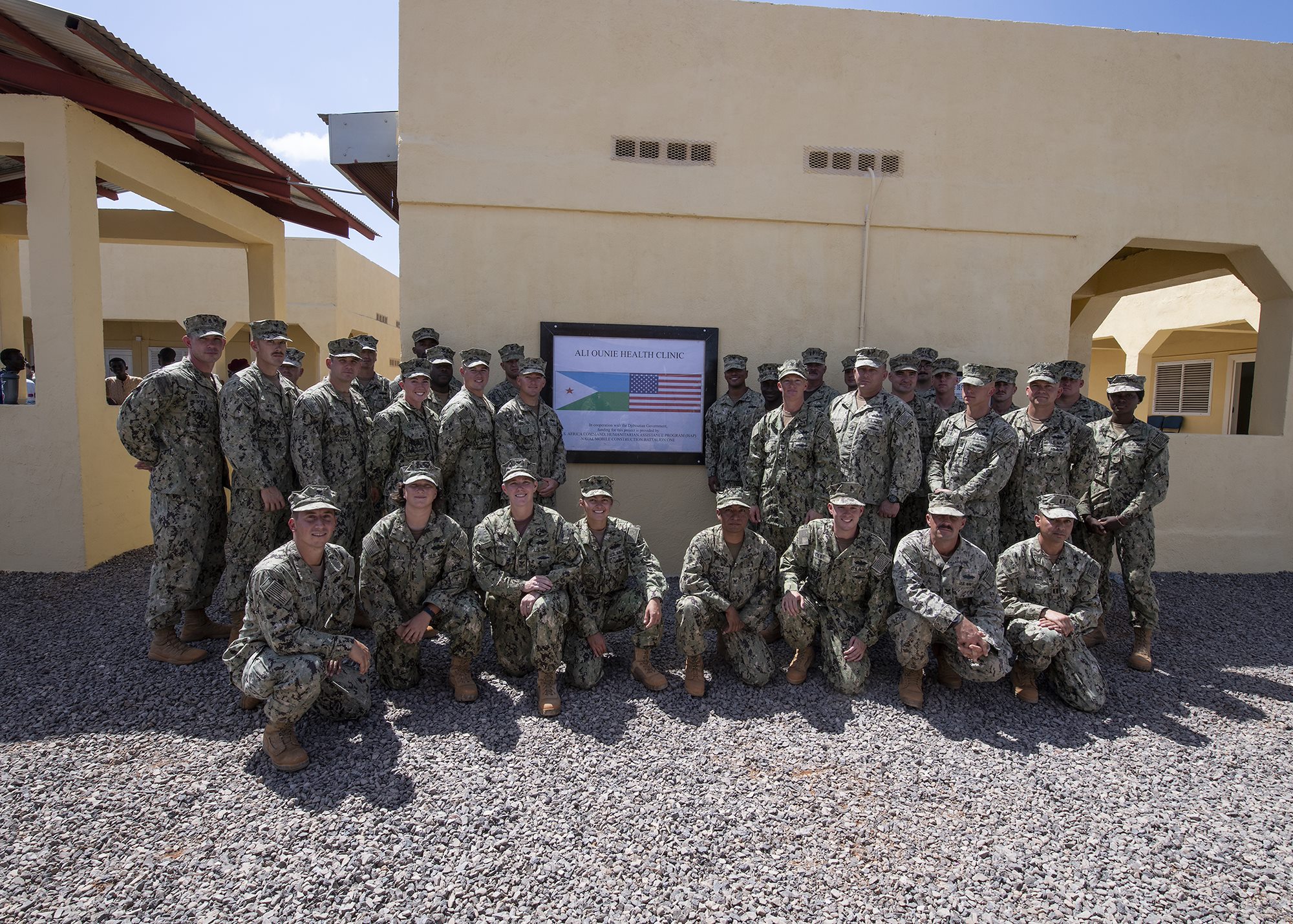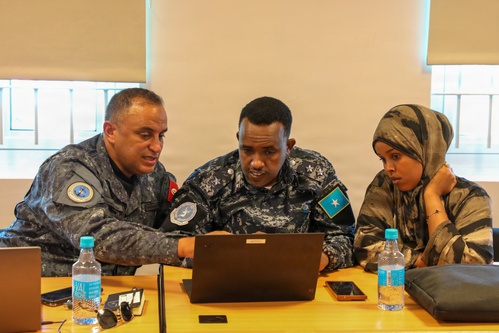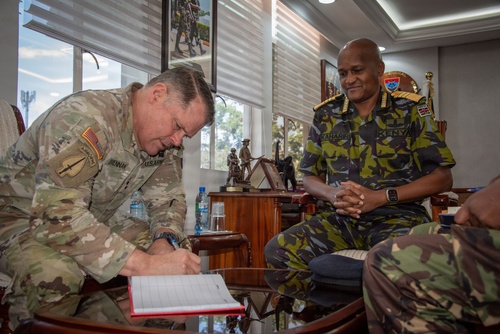Gallery contains 22 images
×
Photo 1 of 22
U.S. Navy Seabees turnover Ali Oune Medical Clinic to Djiboutian officials
U.S. Djibouti Embassy officials, Combined Joint Task Force-Horn of Africa leadership, and Djiboutian government leaders cut the ribbon for the Ali Oune Medial Clinic during a ceremony in Ali Oune, Djibouti, Jan. 31, 2019. The clinic, which U.S. Navy Seabees from Naval Mobile Construction Battalion 1, assigned to CJTF-HOA, have been working to complete for five months, is intended to enhance the Ministry of Health for Djibouti’s ability to provide basic medical, birth and after care to the Ali Oune village and its more than 1,000 residents and rural neighbors. (U.S. Air Force photo by Tech. Sgt. Shawn Nickel)
Photo by: Tech. Sgt. Shawn Nickel
Photo 2 of 22
U.S. Navy Seabees turnover Ali Oune Medical Clinic to Djiboutian officials
Alexander Hamilton, chargé d’ affaires to the U.S. Ambassador to Djibouti, speaks to U.S. Navy Seabees from Naval Mobile Construction Battalion 1, assigned to CJTF-HOA, during the Ali Oune Medial Clinic ribbon cutting ceremony in Ali Oune, Djibouti, Jan. 31, 2019. The clinic, which the Seabees have been working to complete for five months, is intended to enhance the Ministry of Health for Djibouti’s ability to provide basic medical, birth and after care to the Ali Oune village and its more than 1,000 residents and rural neighbors. (U.S. Air Force photo by Tech. Sgt. Shawn Nickel)
Photo by: Tech. Sgt. Shawn Nickel
Photo 3 of 22
U.S. Navy Seabees turnover Ali Oune Medical Clinic to Djiboutian officials
U.S. Army Maj. Gen. James D. Craig, commanding general, Combined Joint Task Force-Horn of Africa (CJTF-HOA), speaks to U.S. Navy Seabees from Naval Mobile Construction Battalion 1, assigned to CJTF-HOA, during the Ali Oune Medial Clinic ribbon cutting ceremony in Ali Oune, Djibouti, Jan. 31, 2019. The clinic, which the Seabees have been working to complete for five months, is intended to enhance the Ministry of Health for Djibouti’s ability to provide basic medical, birth and after care to the Ali Oune village and its more than 1,000 residents and rural neighbors. (U.S. Air Force photo by Tech. Sgt. Shawn Nickel)
Photo by: Tech. Sgt. Shawn Nickel
Photo 4 of 22
U.S. Navy Seabees turnover Ali Oune Medical Clinic to Djiboutian officials
U.S. Navy Seabees from Naval Mobile Construction Battalion 1, assigned to Combined Joint Task Force-Horn of Africa, stand in formation during the Ali Oune Medial Clinic ribbon cutting ceremony in Ali Oune, Djibouti, Jan. 31, 2019. The clinic, which the Seabees have worked on for five months, is intended to enhance the Ministry of Health for Djibouti’s ability to provide basic medical, birth and after care to the Ali Oune village and its more than 1,000 residents and rural neighbors. (U.S. Air Force photo by Tech. Sgt. Shawn Nickel)
Photo by: Tech. Sgt. Shawn Nickel
Photo 5 of 22
U.S. Navy Seabees turnover Ali Oune Medical Clinic to Djiboutian officials
U.S. Djibouti Embassy officials, Combined Joint Task Force-Horn of Africa leadership, and Djiboutian government leaders cut the ribbon for the Ali Oune Medial Clinic during a ceremony in Ali Oune, Djibouti, Jan. 31, 2019. The clinic, which U.S. Navy Seabees from Naval Mobile Construction Battalion 1, assigned to CJTF-HOA, have been working to complete for five months, is intended to enhance the Ministry of Health for Djibouti’s ability to provide basic medical, birth and after care to the Ali Oune village and its more than 1,000 residents and rural neighbors. (U.S. Air Force photo by Tech. Sgt. Shawn Nickel)
Photo by: Tech. Sgt. Shawn Nickel
Photo 6 of 22
U.S. Navy Seabees turnover Ali Oune Medical Clinic to Djiboutian officials
Djiboutian citizens clap during the Ali Oune Medial Clinic ribbon cutting ceremony in Ali Oune, Djibouti, Jan. 31, 2019. The clinic, which U.S. Navy Seabees from Naval Mobile Construction Battalion 1, assigned to CJTF-HOA, have been working to complete for five months, is intended to enhance the Ministry of Health for Djibouti’s ability to provide basic medical, birth and after care to the Ali Oune village and its more than 1,000 residents and rural neighbors. (U.S. Air Force photo by Tech. Sgt. Shawn Nickel)
Photo by: Tech. Sgt. Shawn Nickel
Photo 7 of 22
U.S. Navy Seabees turnover Ali Oune Medical Clinic to Djiboutian officials
U.S. Army Maj. Gen. James D. Craig, commanding general, Combined Joint Task Force-Horn of Africa (CJTF-HOA), receives a gift from Djiboutian government officials during the Ali Oune Medial Clinic ribbon cutting ceremony in Ali Oune, Djibouti, Jan. 31, 2019. The clinic, which U.S. Navy Seabees from Naval Mobile Construction Battalion 1, assigned to CJTF-HOA, have been working to complete for five months, is intended to enhance the Ministry of Health for Djibouti’s ability to provide basic medical, birth and after care to the Ali Oune village and its more than 1,000 residents and rural neighbors. (U.S. Air Force photo by Tech. Sgt. Shawn Nickel)
Photo by: Tech. Sgt. Shawn Nickel
Photo 8 of 22
U.S. Navy Seabees turnover Ali Oune Medical Clinic to Djiboutian officials
U.S. Navy Seabees from Naval Mobile Construction Battalion 1, assigned to Combined Joint Task Force-Horn of Africa, pose for a group photo during the Ali Oune Medial Clinic ribbon cutting ceremony in Ali Oune, Djibouti, Jan. 31, 2019. The clinic, which the Seabees have worked on for five months, is intended to enhance the Ministry of Health for Djibouti’s ability to provide basic medical, birth and after care to the Ali Oune village and its more than 1,000 residents and rural neighbors. (U.S. Air Force photo by Tech. Sgt. Shawn Nickel)
Photo by: Tech. Sgt. Shawn Nickel
Photo 9 of 22
U.S. Navy Seabees turnover Ali Oune Medical Clinic to Djiboutian officials
A Djiboutian youth dressed in military-style uniform salutes a U.S. Navy Seabee, from Naval Mobile Construction Battalion 1, Combined Joint Task Force - Horn of Africa, during the Ali Oune Medial Clinic ribbon cutting ceremony in Ali Oune, Djibouti, Jan. 31, 2019. The clinic, which the Seabees have been working to complete for five months, is intended to enhance the Ministry of Health for Djibouti’s ability to provide basic medical, birth and after care to the Ali Oune village and its more than 1,000 residents and rural neighbors. (U.S. Air Force photo by Tech. Sgt. Shawn Nickel)
Photo by: Tech. Sgt. Shawn Nickel
Photo 10 of 22
U.S. Navy Seabees turnover Ali Oune Medical Clinic to Djiboutian officials
U.S. Navy Seabee Lt. Cmdr. Matthew Baird, detail officer in charge, Naval Mobile Construction Battalion 1, assigned to Combined Joint Task Force-Horn of Africa (CJTF-HOA), leads a formation during the Ali Oune Medial Clinic ribbon cutting ceremony in Ali Oune, Djibouti, Jan. 31, 2019. The clinic, which the Seabees have worked on for five months, is intended to enhance the Ministry of Health for Djibouti’s ability to provide basic medical, birth and after care to the Ali Oune village and its more than 1,000 residents and rural neighbors. (U.S. Air Force photo by Tech. Sgt. Shawn Nickel)
Photo by: Tech. Sgt. Shawn Nickel
Photo 11 of 22
U.S. Navy Seabees turnover Ali Oune Medical Clinic to Djiboutian officials
U.S. Navy Command Master Chief Petty Officer Karl Parsons, command senior enlisted leader, Combined Joint Task Force-Horn of Africa (CJTF-HOA), left, and U.S. Navy Command Master Chief Petty Officer Andy Gray, command senior enlisted leader, Camp Lemonnier, Djibouti, listen to a speech during the Ali Oune Medial Clinic ribbon cutting ceremony in Ali Oune, Djibouti, Jan. 31, 2019. The clinic, which U.S. Navy Seabees from Naval Mobile Construction Battalion 1, assigned to CJTF-HOA, have been working to complete for five months, is intended to enhance the Ministry of Health for Djibouti’s ability to provide basic medical, birth and after care to the Ali Oune village and its more than 1,000 residents and rural neighbors. (U.S. Air Force photo by Tech. Sgt. Shawn Nickel)
Photo by: Tech. Sgt. Shawn Nickel
Photo 12 of 22
U.S. Navy Seabees turnover Ali Oune Medical Clinic to Djiboutian officials
Alexander Hamilton, chargé d’ affaires to the U.S. Ambassador to Djibouti, gives a speech during the Ali Oune Medial Clinic ribbon cutting ceremony in Ali Oune, Djibouti, Jan. 31, 2019. The clinic, which U.S. Navy Seabees from Naval Mobile Construction Battalion 1, assigned to CJTF-HOA, have been working to complete for five months, is intended to enhance the Ministry of Health for Djibouti’s ability to provide basic medical, birth and after care to the Ali Oune village and its more than 1,000 residents and rural neighbors. (U.S. Air Force photo by Tech. Sgt. Shawn Nickel)
Photo by: Tech. Sgt. Shawn Nickel
Photo 13 of 22
U.S. Navy Seabees turnover Ali Oune Medical Clinic to Djiboutian officials
U.S. Navy Petty Officer 1st Class Carroll Bennett, a Seabee from Naval Mobile Construction Battalion 1, assigned to Combined Joint Task Force-Horn of Africa, stands in formation during the Ali Oune Medial Clinic ribbon cutting ceremony in Ali Oune, Djibouti, Jan. 31, 2019. The clinic, which the Seabees have worked on for five months, is intended to enhance the Ministry of Health for Djibouti’s ability to provide basic medical, birth and after care to the Ali Oune village and its more than 1,000 residents and rural neighbors. (U.S. Air Force photo by Tech. Sgt. Shawn Nickel)
Photo by: Tech. Sgt. Shawn Nickel
Photo 14 of 22
U.S. Navy Seabees turnover Ali Oune Medical Clinic to Djiboutian officials
A Djiboutian youth dressed in military-style uniform plays along the road during the Ali Oune Medial Clinic ribbon cutting ceremony in Ali Oune, Djibouti, Jan. 31, 2019. The clinic, which salutes a U.S. Navy Seabee, from Naval Mobile Construction Battalion 1, have been working to complete for five months, is intended to enhance the Ministry of Health for Djibouti’s ability to provide basic medical, birth and after care to the Ali Oune village and its more than 1,000 residents and rural neighbors. (U.S. Air Force photo by Tech. Sgt. Shawn Nickel)
Photo by: Tech. Sgt. Shawn Nickel
Photo 15 of 22
U.S. Navy Seabees turnover Ali Oune Medical Clinic to Djiboutian officials
U.S. Navy Seabees from Naval Mobile Construction Battalion 1, assigned to Combined Joint Task Force-Horn of Africa, stand in formation during the Ali Oune Medial Clinic ribbon cutting ceremony in Ali Oune, Djibouti, Jan. 31, 2019. The clinic, which the Seabees have worked on for five months, is intended to enhance the Ministry of Health for Djibouti’s ability to provide basic medical, birth and after care to the Ali Oune village and its more than 1,000 residents and rural neighbors. (U.S. Air Force photo by Tech. Sgt. Shawn Nickel)
Photo by: Tech. Sgt. Shawn Nickel
Photo 16 of 22
U.S. Navy Seabees turnover Ali Oune Medical Clinic to Djiboutian officials
U.S. Army Maj. Gen. James D. Craig, commanding general, Combined Joint Task Force-Horn of Africa (CJTF-HOA), talks to a Djiboutian military officials during the Ali Oune Medial Clinic ribbon cutting ceremony in Ali Oune, Djibouti, Jan. 31, 2019. The clinic, which U.S. Navy Seabees from Naval Mobile Construction Battalion 1, assigned to CJTF-HOA, have been working to complete for five months, is intended to enhance the Ministry of Health for Djibouti’s ability to provide basic medical, birth and after care to the Ali Oune village and its more than 1,000 residents and rural neighbors. (U.S. Air Force photo by Tech. Sgt. Shawn Nickel)
Photo by: Tech. Sgt. Shawn Nickel
Photo 17 of 22
U.S. Navy Seabees turnover Ali Oune Medical Clinic to Djiboutian officials
U.S. Army Maj. Gen. James D. Craig, commanding general, Combined Joint Task Force-Horn of Africa (CJTF-HOA), walks with Djiboutian government officials during the Ali Oune Medial Clinic ribbon cutting ceremony in Ali Oune, Djibouti, Jan. 31, 2019. The clinic, which U.S. Navy Seabees from Naval Mobile Construction Battalion 1, assigned to CJTF-HOA, have been working to complete for five months, is intended to enhance the Ministry of Health for Djibouti’s ability to provide basic medical, birth and after care to the Ali Oune village and its more than 1,000 residents and rural neighbors. (U.S. Air Force photo by Tech. Sgt. Shawn Nickel)
Photo by: Tech. Sgt. Shawn Nickel
Photo 18 of 22
U.S. Navy Seabees turnover Ali Oune Medical Clinic to Djiboutian officials
U.S. Navy Lt. Mellany George, an engineering project manager assigned to Combined Joint Task Force-Horn of Africa (CJTF-HOA), laughs as she dances with Djiboutian citizens before the Ali Oune Medial Clinic ribbon cutting ceremony in Ali Oune, Djibouti, Jan. 31, 2019. The clinic, which U.S. Navy Seabees from Naval Mobile Construction Battalion 1, assigned to CJTF-HOA, have been working to complete for five months, is intended to enhance the Ministry of Health for Djibouti’s ability to provide basic medical, birth and after care to the Ali Oune village and its more than 1,000 residents and rural neighbors. (U.S. Air Force photo by Tech. Sgt. Shawn Nickel)
Photo by: Tech. Sgt. Shawn Nickel
Photo 19 of 22
U.S. Navy Seabees turnover Ali Oune Medical Clinic to Djiboutian officials
U.S. Navy Lt. Mellany George, an engineering project manager assigned to Combined Joint Task Force-Horn of Africa (CJTF-HOA), laughs as she dances with Djiboutian citizens before the Ali Oune Medial Clinic ribbon cutting ceremony in Ali Oune, Djibouti, Jan. 31, 2019. The clinic, which U.S. Navy Seabees from Naval Mobile Construction Battalion 1, assigned to CJTF-HOA, have been working to complete for five months, is intended to enhance the Ministry of Health for Djibouti’s ability to provide basic medical, birth and after care to the Ali Oune village and its more than 1,000 residents and rural neighbors. (U.S. Air Force photo by Tech. Sgt. Shawn Nickel)
Photo by: Tech. Sgt. Shawn Nickel
Photo 20 of 22
U.S. Navy Seabees turnover Ali Oune Medical Clinic to Djiboutian officials
U.S. Navy Lt. Mellany George, an engineering project manager assigned to Combined Joint Task Force-Horn of Africa (CJTF-HOA), laughs as she dances with Djiboutian citizens before the Ali Oune Medial Clinic ribbon cutting ceremony in Ali Oune, Djibouti, Jan. 31, 2019. The clinic, which U.S. Navy Seabees from Naval Mobile Construction Battalion 1, assigned to CJTF-HOA, have been working to complete for five months, is intended to enhance the Ministry of Health for Djibouti’s ability to provide basic medical, birth and after care to the Ali Oune village and its more than 1,000 residents and rural neighbors. (U.S. Air Force photo by Tech. Sgt. Shawn Nickel)
Photo by: Tech. Sgt. Shawn Nickel
Photo 21 of 22
U.S. Navy Seabees turnover Ali Oune Medical Clinic to Djiboutian officials
Djiboutian citizens gather to greet Combined Joint Task Force-Horn of Africa leadership, U.S. Navy Seabees from Naval Mobile Construction Battalion 1, Combined Joint Task Force - Horn of Africa, and Djiboutian government leaders during the Ali Oune Medial Clinic ribbon cutting ceremony in Ali Oune, Djibouti, Jan. 31, 2019. The clinic, which the Seabees have been working to complete for five months, is intended to enhance the Ministry of Health for Djibouti’s ability to provide basic medical, birth and after care to the Ali Oune village and its more than 1,000 residents and rural neighbors. (U.S. Air Force photo by Tech. Sgt. Shawn Nickel)
Photo by: Tech. Sgt. Shawn Nickel
Photo 22 of 22
U.S. Navy Seabees turnover Ali Oune Medical Clinic to Djiboutian officials
Djiboutian citizens greet military leaders during the Ali Oune Medial Clinic ribbon cutting ceremony in Ali Oune, Djibouti, Jan. 31, 2019. The clinic, which the U.S. Navy Seabees from Naval Mobile Construction Battalion 1, Combined Joint Task Force - Horn of Africa, have been working to complete for five months, is intended to enhance the Ministry of Health for Djibouti’s ability to provide basic medical, birth and after care to the Ali Oune village and its more than 1,000 residents and rural neighbors. (U.S. Air Force photo by Tech. Sgt. Shawn Nickel)
Photo by: Tech. Sgt. Shawn Nickel
U.S. Navy Seabees from Naval Mobile Construction Battalion 1, assigned to Combined Joint Task Force-Horn of Africa, turned over the newly constructed Ali Oune Medical Clinic to Djibouti government officials during a ribbon cutting ceremony at the clinic Jan. 31.
The 2,900-square-foot clinic, which the Seabees spent five months constructing, is intended to enhance the Ministry of Health for Djibouti’s ability to provide basic medical, birth and after care to the Ali Oune village and its more than 1,000 residents and rural neighbors.
“Health is important today and for the future of Djibouti,” said Alexander Hamilton, chargé d’ affaires to the U.S. Ambassador to Djibouti, in a speech at the ribbon cutting. “Thank you to the U.S. military for making this a reality.”
Djibouti has one of the highest maternal death rates among countries in Africa, according to a study by UNICEF. The main causes of death among children under 5 are neonatal ones including infections, prematurity, asphyxia, acute respiratory infections, diarrhea, malaria and malnutrition.
The Seabees, CJTF-HOA and Camp Lemonnier, Djibouti, leadership, and U.S. and Djiboutian government leaders attended the ceremony.
Projects like the women’s medical clinic will not only help reduce the mortality rates of both mothers and infants, but will also build relationships with the community.
“Giving birth isn’t something that is easy, and where they historically give birth here is risky,” said U.S. Navy Seaman Mariame Cherif, a Seabee assigned to NMCB 1 and one of the only female Sailors working on the clinic who also fills the role of interpreter. “It makes me feel happy to do this for them.”
Thirty kilometers from the city of Djibouti, Ali Oune is only accessible by a rough dirt road, which can be washed out by rains and is notorious for flat tires due to large rocks. It’s not uncommon to see rolled or disabled vehicles along the route. This brought logistical challenges for the 34 Seabees who lived on site for the duration of the five months.
“Getting materials out here, along with the heat, is just one of the challenges,” said Lt. Cmdr. Matthew Baird, detail officer in charge, NMCB 1. “These Seabees pushed though and have done what they needed to do with a great attitude and an unprecedented speed. I’m proud of the work they have done out here. Knowing that we are going to be affecting generations to come and giving them a better start from birth is the reward for all the work.”

